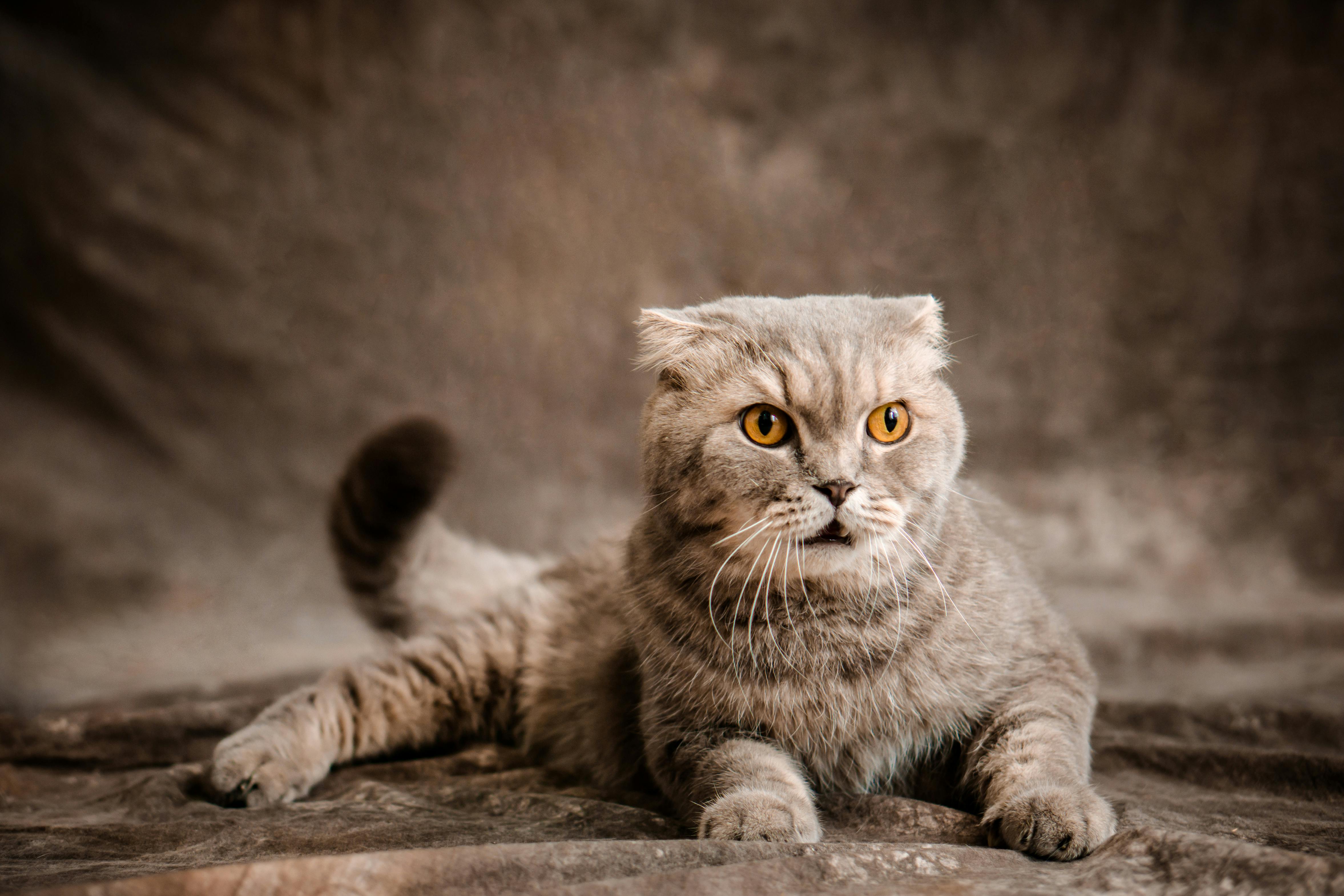Scottish Fold

History:
The Scottish Fold is a distinctive and endearing breed that originated in Scotland in 1961. The first known Fold cat, named Susie, had unique forward-folded ears caused by a natural genetic mutation. Susie’s kittens inherited this trait, and selective breeding with British Shorthairs and American Shorthairs helped establish the breed. Recognised for their calm demeanour and signature folded ears, Scottish Folds quickly gained popularity. While all Folds are born with straight ears, the fold usually develops within the first few weeks if they carry the gene. Known for their sweet temperament, Scottish Folds are affectionate, playful, and adapt well to a variety of home environments.
Size: Medium-sized cat
Height: 20–25 cm
Weight: 3.5–6 kg
Life Expectancy: 11 to 15 years

Breed Appearance:
The Scottish Fold is a medium-sized cat with a rounded, sturdy build and a soft, plush coat that may be short or long, depending on the variety. Their most iconic feature is their tightly folded ears, which bend forward and downward, giving the head a rounded, "owl-like" appearance. They have large, round eyes that convey a sweet and expressive look, and their face is broad with prominent cheeks and a gently curved profile. The body is compact but muscular, with medium-length legs and a proportionate tail that may be tapered or thick. Coat colours and patterns vary widely, including solids, tabbies, and colour points. Their overall appearance is balanced, round, and soft in expression.
Health & Care:
While generally healthy, Scottish Folds are prone to a genetic condition called osteochondrodysplasia, which affects cartilage and bone development, particularly in the limbs and tail. This condition can lead to joint pain or mobility issues, especially in cats with tightly folded ears. Regular veterinary monitoring is essential to detect and manage any early signs. Their plush coat requires regular brushing—once a week for short-haired Folds, more often for long-haired varieties. A nutritious diet, routine dental care, and moderate exercise are key to their overall well-being. Ensuring they maintain a healthy weight also reduces strain on their joints.

Living Conditions:
Scottish Folds adapt well to most living environments, including small apartments and larger homes, as long as they have comfortable spaces to relax and interact with their family. They enjoy calm, stable settings and prefer routine over chaos. While they are not overly needy, they do thrive on gentle attention and companionship. Their mellow nature makes them ideal for quieter households, although they also do well with respectful children and calm pets. Providing cosy spots, window views, and occasional play opportunities keeps them content. They are not prone to high activity levels, so mental and emotional enrichment are more important than constant physical exertion.
Grooming:
Scottish Folds are easy to groom, especially the short-haired variety, which only needs brushing once a week to remove loose hair and reduce shedding. Long-haired Folds require brushing two to three times weekly to prevent tangles and mats. Regular grooming also helps keep their coat shiny and their skin healthy. Routine care should include dental hygiene, nail trimming, and checking their ears for cleanliness and infections, especially important due to their folded shape. Bathing is rarely needed unless the cat becomes especially dirty. Overall, they are a low-maintenance breed that benefits from a consistent grooming routine.

Advantages:
-
Scottish Folds are gentle, affectionate companions known for their calm and easygoing personalities, making them excellent pets for families, singles, and seniors alike.
-
Their compact size and moderate activity level make them well-suited to various living environments, from apartments to spacious homes.
-
They are generally quiet cats that communicate with soft meows and expressive eyes, ideal for owners who prefer a more tranquil pet.
-
With a sweet and friendly disposition, they usually get along well with children and other pets, adapting easily to multi-pet households.
-
Their adorable, owl-like appearance and distinctive folded ears give them a unique charm that many cat lovers find irresistible.
Disadvantages:
-
Scottish Folds can be prone to genetic cartilage and bone disorders, particularly if both parents have folded ears, leading to potential pain or mobility issues.
-
Their calm demeanour may mask signs of discomfort, so owners must be vigilant about their physical health and mobility.
-
Long-haired variants require more grooming and may be prone to matting without regular care.
-
Because of their quiet nature, they may not be as interactive or engaging as more vocal, energetic breeds, which some owners may find less stimulating.
-
They form strong bonds and may become emotionally distressed if ignored or left alone for extended periods without companionship.

